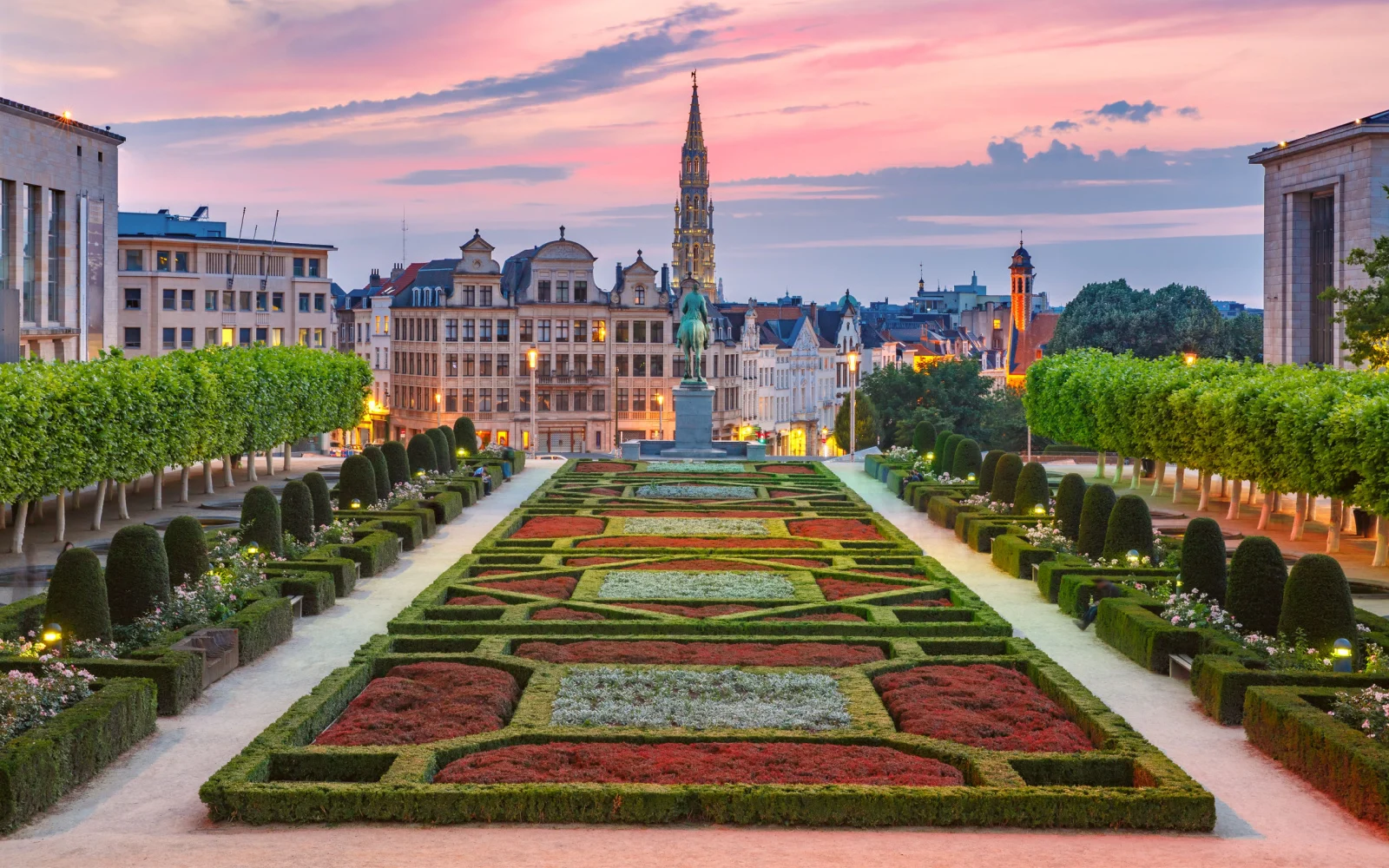What's the best time to visit Belgium?
The overall best time to visit Belgium is from April to September for warm weather and fewer crowds, ideal for enjoying local festivals and outdoor sightseeing.
This period offers a perfect blend of pleasant temperatures, ranging from the low 40s to the low 70s, and lower rain frequency, making it ideal for exploring attractions like Parc de Bruxelles and attending events like the Tomorrowland Music Festival and Belgian Beer Weekend.
Belgium is a land of grand medieval and Renaissance architecture, connecting its historic, walkable cities with a network of canals. But what’s the best time to visit Belgium to make the most of your trip?
We’ll dive into the different travel seasons in this stunning European destination, showing you the overall best, cheapest, least busy, and worst times to visit. You’ll be able to plan your Belgium trip dates to align perfectly with your travel goals!
The Overall Best Time to Visit Belgium
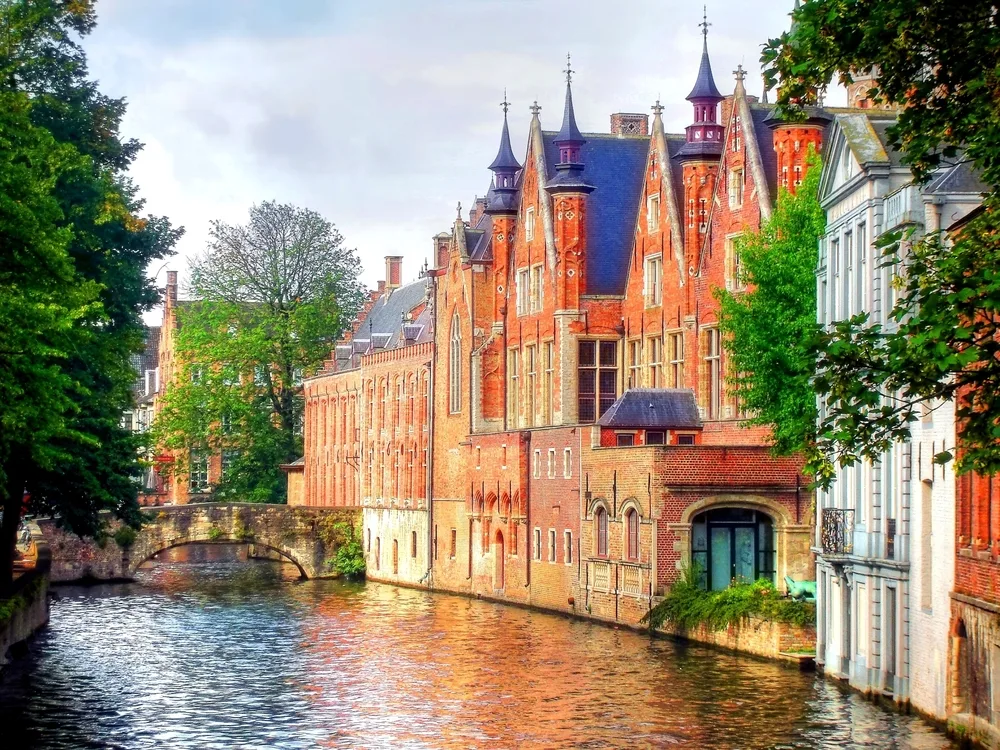
Chantal de Bruijne/Shutterstock
The overall best time to visit Belgium is between April and September, when the weather is warm, rain is less common, and festivals are in full swing.
Belgium’s peak travel season runs from June to August, so adding the shoulder season months of April, May, and September makes it possible to enjoy the best weather without the big crowds of the high season if you’re looking for a more laid-back experience.
Belgium’s weather between April and September is balmy and mild, seeing highs from the low 40s (April) to the low 70s (July and August). During this period, rain is less common than late fall and winter, making it a better time for sightseeing and outdoor activities.
- April: 43-54°F; 6-8 rainy days
- May: 48-63°F; 8-10 rainy days
- June: 55-68°F; 8-10 rainy days
- July: 59-72°F; 8-10 rainy days
- August: 59-72°F; 8-9 rainy days
- September: 52-66°F; 8-9 rainy days
The weather is prime for activities like attending local festivals, strolling through Parc de Bruxelles and the Atomium architecture exhibits in Brussels, and browsing the Baroque Grote Markt (Grand Place Market) in Brussels.
Since it’s the peak season for tourism across Belgium, you’ll have to contend with higher prices than you’d find during the off-season. Here’s a look at hotel price averages using Google Hotels data for 2-5 star hotels in Belgium this time of year:
- April: $138/night
- May: $141/night
- June: $132/night
- July: $138/night
- August: $144/night
- September: $138/night
Planning your visit for June will net you the lowest average prices on hotels during this time period, but you’ll find lower-than-average prices if you focus your search on 2-3 star hotels in the cities you’re planning on visiting.
April to September is a great time to check out festivals and events around the country, with the warm weather drawing people to fun, seasonal events from music festivals to sporting events:
- Tour of Flanders (Apr.): Annual road cycling competition in the UCI World Tour held in Flanders (also called De Ronde or Vlaanderens Moosite, meaning “Flanders Finest”)
- Lotto Brussels Jazz Weekend (May): Popular jazz festival that takes place in multiple public squares and indoor music venues in Brussels during the end of May
- Graspop Metal Meeting (Jun.): 80+ metal and rock bands come to Dessel for a 4-day music festival featuring international and local talent with free and paid campgrounds onsite
- Ommegang Festival (Jul.): Medieval 2-night festival and show in Brussels that includes a procession through the Grand Place (Grote Markt) public square in period-accurate costumes with food and drink stalls
- Tomorrowland Music Festival (Jul.): Famous electronic music festival held in Boom’s De Schorre park with hundreds of popular music acts in two 3-day weekends in mid and late July with 600+ DJs on 14 stages
- National Day (Jul. 21): National holiday honoring the first king, King Leopold I, that’s celebrated around the country, but the biggest events happen in Brussels’ Parc de Bruxelles and Place Poelaert with free parades, concerts, food stalls, and more
- Ghent Jazz Festival (Jul.): Popular jazz festival that takes place for most of the month of July at Music Center De Bijloke in Ghent with local and international musicians performing
- Gentse Feesten (Jul.): Annual music and theater fest in Ghent featuring buskers, mimes, and huge stage acts with millions in attendance each year
- Belgian Beer Weekend (Sept.): Beer gets celebrated in a big way around Brussels, Belgium, thanks to this event held by the National Federation Of Belgian Beers at Grand Marché with samples, beer for purchase, food stalls, music, and more
- Bruges BierFestival (Sept.): More than 80 local breweries offer hundreds of beer varieties on tap and bottled to try in Bruges, along with tons of food stalls and activities
Locals and seasoned travelers alike will recommend timing your visit with the start and end of peak season for smaller crowds and chances to score cheaper hotel rooms, so consider April, May, and September when planning your trip dates.
Cheapest Time to Visit Belgium
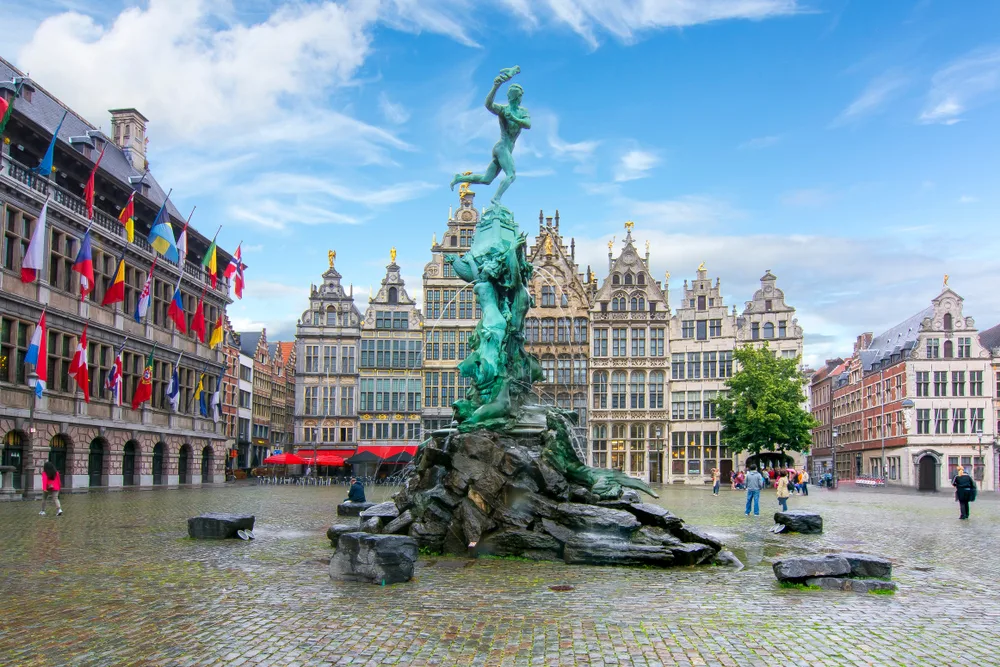
Mistervlad/Shutterstock
The cheapest time to visit Belgium is during January, February, and November (avoiding December, which sees higher prices with the peak Christmas travel period).
Belgium isn’t as expensive to visit as some of its neighboring countries, like France, but costs can add up and make it important to pinpoint the cheapest months to visit if you’re trying to stick to a tight budget. January, February, and November fit the bill!
During these less-expensive winter months, tourism experiences a dip with the cold temperatures and snowfall that leads to lower prices at hotels around the country, good prices on airfare, and the potential for discounts on tours and attractions.
Highs in the mid 30s to upper 40s with snow (especially around south Belgium, which can see 1-3″ of snow per month this time of year) might make it less inviting, but if you’re into exploring and sightseeing in a winter wonderland, you might really enjoy it.
- January: 37-43°F; 9-10 rainy/snowy days
- February: 35-44°F; 7-9 rainy/snowy days
- November: 39-48°F; 9-10 rainy/snowy days
Starting in late November, Christmas markets in Brussels will begin to pop up and the Mannekin Pis statue gets dressed in a winter “costume,” while grabbing a famous hot chocolate in Bruges can warm you up and sightseeing around Ghent’s medieval squares is quite picturesque in winter.
The main draw to visiting during January, February, and November is the chance to save money on accommodations (and flights, if you travel in February). We analyzed Google Hotels data to find average nightly rates this time of year:
- January: $92/night
- February: $117/night
- November: $107/night
While January is the cheapest month to visit for hotels, February might be your best bet overall with the combination of low hotel prices and some of the year’s lowest average airfare costs to Belgium.
You’ll find several events happening during the colder months of the year in Belgium, though not as many as during the summertime:
- Festival of Fools/Bommelsfeesten (Jan.): Festival in Ronse with masked Bommels, or fools, performing comedy acts along with buskers, food stalls, and more
- Antiques and Fine Arts Fair (Jan.): Brussels’ gathering of antique and art dealers to bring history and fine art to the city in an annual fair at the city’s old port
- Ghent Light Festival (Jan.): A free festival when the city of Ghent is illuminated at night with special light displays designed by artists from around the world, offering free walking tours
- Carnival (Feb./Mar.): Several of Belgium’s cities celebrate with food, parades, costumes, and revelry before the start of Lent, including Eupen, Aalst, Binche, and Malmedy
- Bright Brussels Festival of Lights (Feb.): A 4-night light festival that takes place in Brussels’ neighborhoods (Royal Quarter and European Quarter) and museums with special performances, art installations, and kids’ activities
- Antwerp Book Fair (Nov.): Book publishers and authors present their newest works from Dutch and Flemish publishers in this annual event at the Antwerp Expo Center
Aim for February for the cheapest costs overall for your Belgium visit, stick to January for the lowest hotel prices, or opt for November if you’re hoping to catch the start of the country’s famous Christmas cheer and slightly warmer temperatures.
Least Busy Time to Visit Belgium
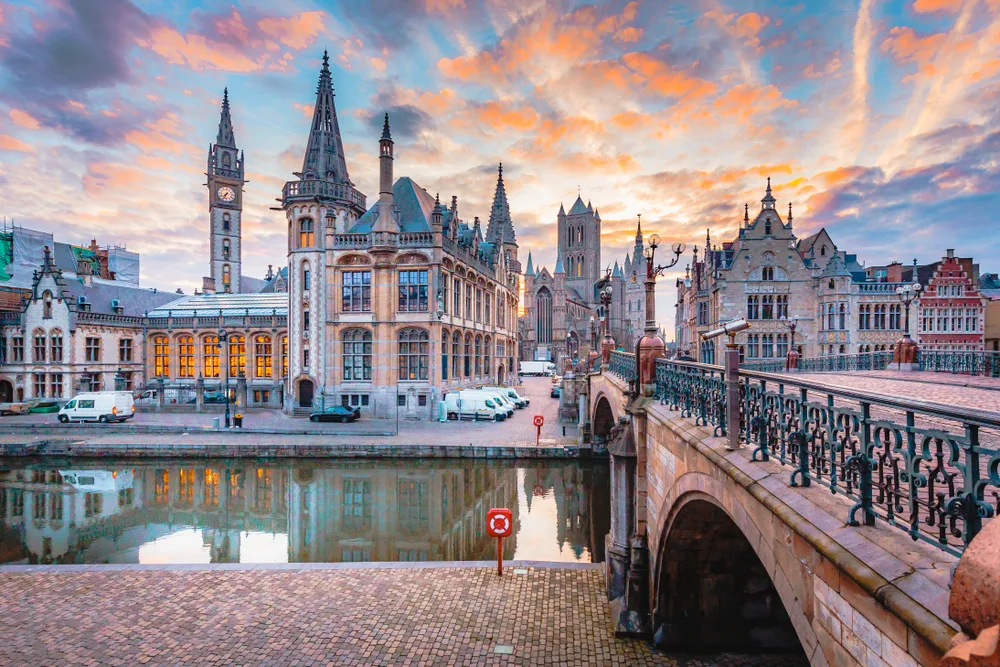
Canadastock/Shutterstock
The least busy time to visit Belgium is between January and April, when cold weather and fewer scheduled events leave Belgium less crowded.
For many, visiting Belgium is prime when the crowds die down and the country’s cobblestone streets and imposing castles stand unencumbered by throngs of eager tourists. If that’s you, going between January and April will be ideal.
This period includes winter and the start of spring, so you’ll be able to adjust your travel dates to suit your preferences. If you want to bundle up and see snow, January and February are nice. March and April are warmer and see highs in the upper 40s and mid-50s.
- January: 37-43°F; 9-10 rainy/snowy days
- February: 35-44°F; 7-9 rainy/snowy days
- March: 37-48°F; 7-9 rainy/snowy days
- April: 43-54°F; 6-8 rainy days
Of these months, January is the snowiest and can see anywhere from 0.4″ (Bruges) to 3.2″ (Saint-Hubert) of snow. April is the warmest of the less-busy months to visit and sees favorable conditions with little rainfall that are ideal for sightseeing.
It’s a great time to enjoy live music at a jazz club in Brussels, stroll through Baroque and medieval architecture in public squares, tour the medieval Gravensteen Castle in Ghent, or explore the Caves of Han-sur-Lesse and Wildlife Park in Rochefort.
You’ll appreciate the average hotel rates during January and February (2 of the cheapest months to visit), but the warmer weather in March and April may make it worth paying a little more per night.
Here’s a look at the average rates for 2-5 star hotels across Belgium from Google Hotels data:
- January: $92/night
- February: $117/night
- March: $140/night
- April: $138/night
You’ll find several events and festivals happening during January and February, including Festival of Fools in Brussels, Carnival parades across the country, and special light displays in Ghent and Brussels (see Least Busy Time to Visit for more).
March and April events around Belgium include the following:
- Dead Rat’s Ball/Bal du Rat Mort (Mar.): An upscale-yet-comedic charity event with donors dressing up for a dinner and gala named after a Parisian cafe during the first weekend of March
- Tour of Flanders (Apr.): Road cycling event that’s part of the UCI World Tour in Flanders, as hundreds of cyclists take to the roads to compete in the tour
- Sablon Spring Baroque Music Festival (Apr.): The public square hosts concerts outdoors on Place du Grand Sablon during April and May
- Brussels International Fantastic Film Festival (Apr.): A festival featuring sci-fi and fantasy film screenings at movie theaters around Brussels from local and international creators
- May Day’s Eve Festival/Meiavondviering (Apr.): A celebration ahead of May Day (May 1) at the end of April with tree planting and winter effigy burning on the Grote Markt
If you’re looking for least crowded months overall, Google Hotels data shows January and March to be the least-visited months in Belgium for the most wide-open tourism experience.
Worst Time to Visit Belgium
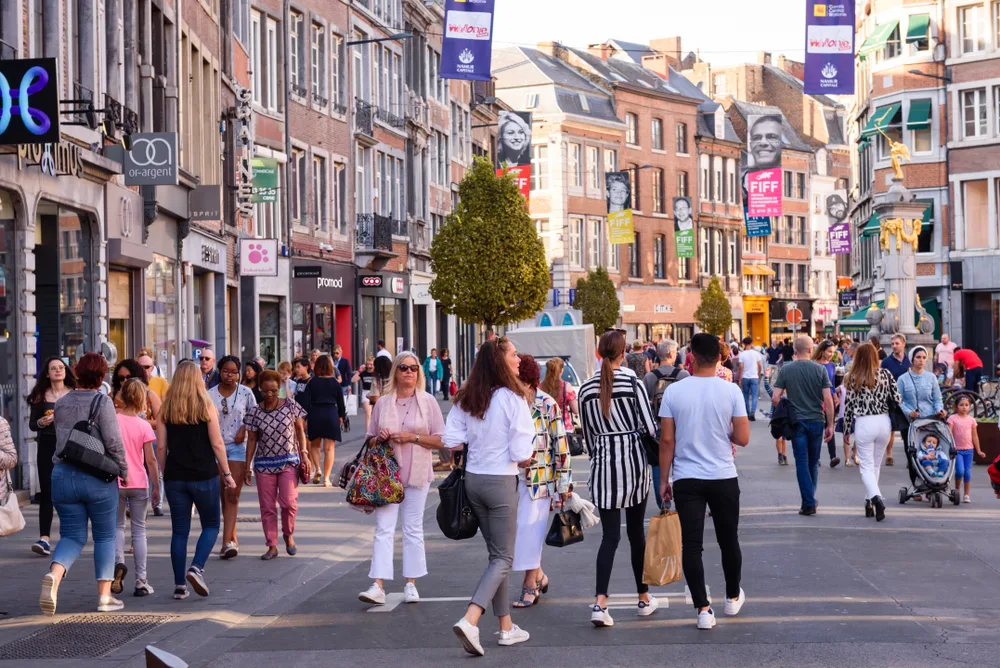
Namur, Belgium. Sept 21, 2019. Shopping street in city center of Belgian city Namur. People with shopping bags walking in pedestrian street. Crowded street with shops in Namur, Belgium/Thomas Dekiere/Shutterstock
December may be the worst time to visit Belgium overall, seeing the highest average hotel prices of the year, the most rain and snow, and big Christmas season crowds.
The month of December, magical as it may be in Belgium, is also a time for huge crowds, limited hotel and flight availability, long lines and wait times at restaurants and attractions, and cold, snowy weather.
With these less-than-stellar characteristics combined, December is actually one of the worst months to visit Belgium of the year. The weather ranges from the low 30s to the low 40s with 0.6″ (Brussels) to 3.6″ (Saint-Hubert) of snowfall and the month sees 10-11 rainy or snowy days.
You can’t even look to low hotel prices to save the day when it comes to visiting in December. With the arrival of the Christmas season, tourists arrive in droves and drive up the usually-low winter hotel rates to around $159/night on average (Google Hotels data).
The saving grace for a December visit can be the holiday-themed events and markets around the country and the possibility of arriving to a wintry wonderland (if that’s your thing). Here’s a look at events taking place in December:
- Christmas markets (Dec.): Vendors set up at public squares in Brussels, Bruges, Ghent, and more with chalets selling gifts, food stalls, kiddie rides, and holiday decorations
- Christmas events (Dec.): Special activities like nativity scenes with real animals, ice skating rinks, carousels, and Christmas tree lighting ceremonies take place around Belgium throughout the month
Trying hearty stews and meals, like carbonnade flamande (beef stew) and stoemp (mashed potatoes/root veggies) at Belgium’s pubs and restaurants is a nice way to make the most of a chilly day, while skiing in the Ardennes mountains or visiting Bouillon Castle in Wallonia are fun activities for a December trip.
Belgium by Month: Climate & Activities
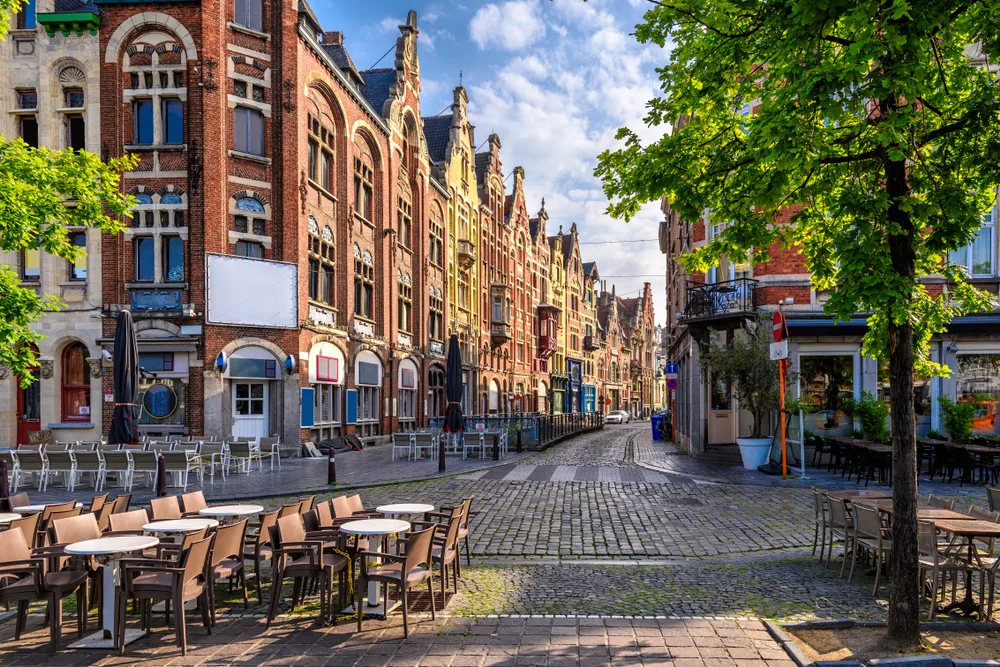
Catarina Belova/Shutterstock
Belgium offers a different experience during each season, from a cold and snowy winter wonderland to the bustling and vibrant days of the mild summer months.
Winter brings snow, chilly air, and holiday festivals; spring is a time of slowly-warming weather, blooms, and sightseeing; summer sees lush greenery and peak tourism; fall is a popular shoulder season with mild weather and frequent showers.
Here’s a look at what you can expect by month in Belgium, from weather averages to sightseeing ideas and monthly events.
January
January in Belgium is cold and damp, with temperatures ranging from 1 to 6°C (34-43°F). This month is perfect for enjoying Belgium’s famous hot chocolate and waffles, exploring medieval towns like Bruges under a winter blanket, and visiting indoor attractions like the Royal Museums of Fine Arts in Brussels.
February
February continues with chilly weather in the 30s and low 40s, ideal for experiencing the Bright Brussels Festival of Lights, indulging in Belgium’s renowned chocolates, especially around Valentine’s Day, and exploring the historic city of Ghent.
March
As spring approaches, temperatures in Belgium range from 3 to 9°C (37-48°F). March is great for visiting the Floralia Brussels Flower Show, exploring the Antwerp Diamond District, and enjoying the fresh air in the Ardennes mountains.
April
April brings milder weather, with temperatures around 6 to 12°C (43-54°F). Enjoy the blooming tulips at the Royal Greenhouses of Laeken, explore the UNESCO-listed Grand Place square in Brussels, and visit the medieval city of Leuven in April.
May
May sees warmer temperatures from 9 to 17°C (48-63°F) with some rain showers. It’s an excellent time for cycling through Flanders’ countryside, visiting the historic battlefields of Ypres, and attending the Jazz Marathon in Brussels.
June
June brings pleasant weather, with temperatures between 13 to 20°C (55-68°F) and 9-10 rainy days. Enjoy outdoor festivals like the Graspop Metal Meeting, relax in the seaside town of Ostend, and explore the medieval castles in Wallonia.
July
July is warm and a bit less rainy, with temperatures from 15 to 22°C (59-72°F). Celebrate National Day on July 21 with festivities in Brussels, attend the Ghent Jazz Festival, and enjoy the vibrant nightlife in Antwerp.
August
August continues with warm weather, offering temperatures from 15 to 22°C (59-72°F) and 8-9 rainy days. Visit the Pukkelpop music festival in Hasselt, explore the canals of Bruges by boat, and enjoy the beaches along the Belgian coast.
September
As fall begins, temperatures in Belgium range from 11 to 19°C (52-66°F) with around 8 days of rain. September is perfect for tasting Belgian beers during Brussels Beer Weekend, exploring the Wallonia region during the Heritage Days, and hiking in the High Fens.
October
October sees cooler temperatures from 8 to 14°C (46-57°F) and 9-10 rainy days. Enjoy the fall colors in the Sonian Forest, visit the charming town of Durbuy, and explore the comic book murals in Brussels.
November
Fall temperatures in November range from 4 to 9°C (39-48°F) with rain picking up slightly from October. This month is ideal for exploring museums like the Musée Hergé, enjoying comfort food in cozy Belgian cafes, and attending the Antwerp Book Fair.
December
Winter brings cooler temperatures ranging from 1 to 6°C (34-43°F) and is the wettest month of the year with 10-11 rainy days. December is festive with Christmas markets in cities like Brussels, Ghent, and Antwerp, ice skating rinks, and enjoying traditional Belgian holiday treats like speculoos and mulled wine.
Frequently Asked Questions
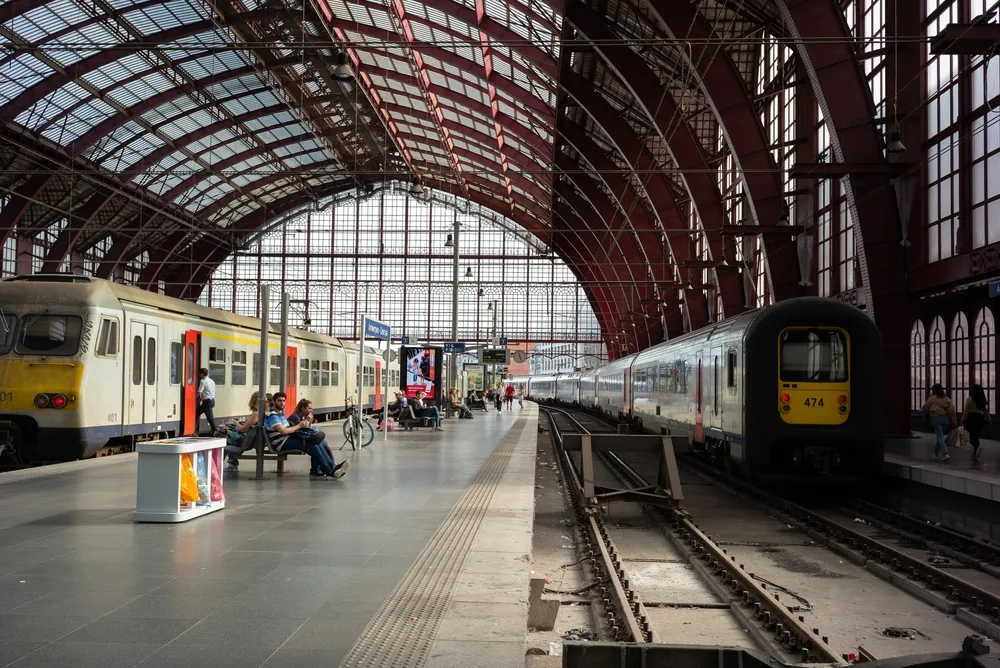
Antwerpen Station (Antwerpen-Centraal) , located in Antwerp. It was built between 1895 and 1905, considered the fourth most beautiful railway station in the world. in Antwerp August 5, 2023 BelgiumOscar Gonzalez Fuentes/Shutterstock
Wondering if there’s something you forgot to research about the best time to visit Belgium? Check out the most frequently asked questions below to learn more before you start planning.
How many days are enough for Belgium?
You should spend 3-5 days in Belgium for a chance to explore some of its most impressive medieval and Renaissance architecture, visit museums and galleries, sample different restaurants, and attend some local festivals and events.
Exploring its most popular cities, like Brussels, Ghent, Bruges, and Antwerp, should take you around 1-2 days each. Make time to see Brussels, Bruges, and Ghent if you're not sure where to head.
Is Belgium better in summer or winter?
Belgium is better in summer, when temperatures are warm (usually mid-60s to low 70s), conditions are drier, and sightseeing is more enjoyable without heavy rain or chances of snow. Summer is the peak tourism season, so prices are slightly higher and crowds are bigger this time of year.
Winter can be nice for a visit, but it’s most crowded during December with Christmas events and tourism driving up hotel prices to their highest rates of the year. Cold weather in the 30s and 40s and chances of snow can add to the challenge of visiting in December.
Is Belgium expensive to vacation?
Belgium can be expensive to vacation, but minding your budget and going during the cheapest time of year (January, February, and November) can help you whittle down your costs. Trip.com estimates $50-$80 per day for general expenses, not counting your hotel room ($92-$107/night on average during the cheapest months).
Look for free activities held in the public squares, visit free museums and galleries, spend time sightseeing and hiking, and stick to affordable meals when dining out to make Belgium more budget-friendly.
What is the best month to visit Bruges?
The best month to visit Bruges is anytime between April and September, though April, May, and September see the lowest prices and slightly smaller crowds than the peak months of June through August.
Bruges enjoys mild to warm weather ranging from the low 50s to the mid-70s with 6-10 rainy days per month during the April to September period, making it our favorite time of year to visit.
Why is Bruges so famous?
Bruges is famous for its medieval Gothic architecture, top-tier sightseeing at landmarks like the Belfry of Bruges and Basilica of the Holy Blood, captivating markets in the Market Square at Christmas, and charming cobblestone streets.
Bruges also holds several famous festivals and events throughout the year, including music and beer festivals, art and antique fairs, and cultural events that draw millions to the city.
So, What’s the Best Time to Visit Belgium?
Overall, the best time to visit Belgium is between April and September for a prime mix of great, dry weather, fair pricing on hotels, and tons of festivals and events happening around the country.
Looking for a more budget-friendly time to go? Aim for January, February, or November when hotel prices drop as low as $92/night on average.
January through April see the fewest visitors, making these ideal months if you want to avoid crowds. December is the worst time to visit with the huge Christmas crowds, cold weather, and higher prices.
With stunning architecture, beautiful scenery, bustling cities, and world-famous sweets, Belgium is a true gem that promises an awe-inspiring experience of castles, cobblestone streets, and cozy restaurants and shops that lend an enchanting air to any visit — especially when you go during the best time of year.



